
Topics
Guests
- Howard ZinnProfessor Emeritus of Political Science at Boston University. He is the foremost radical historian in the United States, co-edited the Pentagon Papers with Professor Noam Chomsky, and authored several books, including A People’s History of the United States and You Can’t Be Neutral on a Moving Train.
Last week’s announcement of the proposed merger of two oil giants, Exxon and Mobil, would create not only the largest oil company in the world, but also the world’s single largest corporation. This merger would also reunite two of the seven companies that made up the Standard Oil monopoly of John D. Rockefeller, a monopoly that was broken up in 1911 in what was perhaps the most famous antitrust action in U.S. history. Activists and corporate regulators have already expressed outrage and concern at the move, which could result in the loss of more than 20,000 jobs. Connecticut’s attorney general has announced plans to investigate the merger. Activists add that the merger will mean a significant threat to the environment, workers rights and the very principles of democracy. We speak with historian Howard Zinn for the historical context of the merger, as well as his philosophy on life and activism. [includes rush transcript]
Related link:
- Democracy Now! 5/13/98–Historian Zinn Addresses Nation’s Censored Reports
Transcript
AMY GOODMAN: Last week’s announcement of the proposed merger of the two oil giants, Exxon and Mobil, would create not only the largest company in the world, but the single largest oil corporation, as well. This merger would also reunite two of the seven companies that made up the Standard Oil monopoly of John Rockefeller, a monopoly that was broken up in 1911 in what was perhaps the most famous antitrust action in U.S. history.
Activists and corporate regulators alike have already expressed outrage and concern at the move, which would result in the loss of more than 20,000 jobs. Already Connecticut’s attorney general has announced plans to investigate the union, and the chair of the Senate’s Antitrust Subcommittee describes the move as “worrisome.” Activists also say the merger of these companies will mean a significant threat to the environment, workers’ rights and the principles of democracy.
All of this is part of a larger trend toward larger power for corporations, power that calls into question the very notion of nation states. As we’ve reported on Democracy Now! in the past, companies like Wal-Mart have a larger economy than most countries in the world.
Joining us now to discuss these trends is historian Howard Zinn. Howard Zinn is the author of several books, including A People’s History of the United States and You Can’t Be Neutral on a Moving Train.
Welcome to Democracy Now!, Professor Zinn.
HOWARD ZINN: Thank you for inviting me.
AMY GOODMAN: Well, it’s great to be with you to discuss this massive merger, as well as other issues—for example, putting the impeachment hearings in context. But let’s start with this proposal to make ExxonMobil one company that would be called ExxonMobil.
HOWARD ZINN: Well, you know, it’s just part of a long-term development in American history of the increasing power of corporations. You were talking about the breakup in 1911 of the Standard Oil Company, which at that point had what was very close to, you know, total monopoly, 90 percent of the oil production and three-quarters of the oil transport and so on. And 1911, the Supreme Court broke it up into a number of different entities. And what we have now is the two largest entities—that is, what was then Standard Oil of New Jersey, Standard Oil of New York, which became Exxon and Mobil—these two largest entities now have rejoined.
And what it suggests is that a whole history of regulation of corporations is a history of futility, and that is, that gestures have been made all through, you know, the last hundred years in American history in the direction of regulating corporations, but none of them succeed. In fact, none of them are intended to succeed in really diminishing the power of corporations. I mean, the Sherman Antitrust Act of 1890 was set up as the author, John Sherman, said, you know, set up really for the purpose of sort of holding off the anti-monopoly furor of that time, of the Populist movement and of the farmers’ movement, a new design to sort of appease the people who were calling for diminishing the power of corporations. And the Sherman Antitrust Act was actually most effectively used against labor unions, like, you know, to break up the 1894 Pullman Strike. And then the Clayton Antitrust Act of 1914, the Federal Trade Commission set up around the same time, really all designed to try to quiet the antitrust feeling in the country, but not really to do anything important about corporate power.
You know, in the 1930s, Thurman Arnold, the attorney general of the United States, who had talked about the fact that there was no—not much success in regulating the power of corporations, you know, he became the head of the Antitrust Division of the Department of Justice at that time, and when he became head, nothing changed. And that’s still true today. The Antitrust Division of the Department of Justice approves all of the things that go on, just as it will approve the present merger.
And, you know, here’s something that I noticed that was right after this happened last week. There was a discussion, quite a long discussion, on The Lehrer Report on Public Broadcasting, a sad commentary on Public Broadcasting, because three pundits were discussing the merger and talking about it at length, and in no point in their discussion did they talk about the effect of the merger on working people, the loss of jobs, the effect on the environment. You know, the head of Exxon, who is going to be the big cheese in this new merger, has said again and again he didn’t really believe the stories about global warming. And, of course, the oil companies are the great perpetrators of the crime of polluting the environment. Nothing was said about the effect on workers. Nothing was said about the effect on the environment. Nothing was said about the effect on consumers. And so that the—we find that the major media really, you know, collaborating with corporate power in hiding from the public the human consequences of mergers and the growth of corporate power.
AMY GOODMAN: You’re listening to Howard Zinn. He is the author of many books, including People’s History of the United States, as well as his own, really, autobiography, You Can’t Be Neutral on a Moving Train. Professor Zinn, I have to say, this is the first time I’ve heard that the Sherman Antitrust Act was originally set up and used against unions.
HOWARD ZINN: Oh, yeah. Yeah, because it said we mustn’t have restraint of trade. But it was not used against corporations, but it was passed in 1890. In 1894, Eugene Debs led a nationwide railroad strike, and then the government used the Anti-Sherman—the Sherman Antitrust Act, saying that by shutting down the railroads, they were restraining interstate commerce. And as a result of this, they were able to get court injunctions to effectively break the strike and put Eugene Debs in jail.
AMY GOODMAN: Now, what about the whole effort, really, of President Theodore Roosevelt also to go after Rockefeller and Standard Oil, Exxon being Standard Oil of New Jersey, Mobil being Standard Oil of New York, after the breakup in 1911? But President Theodore Roosevelt called Standard Oil and the executives of Standard Oil as the biggest corporate criminals in the country.
HOWARD ZINN: Well, Theodore Roosevelt was great at rhetoric and denouncing corporate power. But the fact is that he—although he got a reputation as a trust buster, he actually did less against trusts than his successor, the conservative Republican, William Howard Taft. And Roosevelt—it’s true that under Roosevelt’s administration, they sort of initiated this suit that then led to the 1911 decision, but the 1911 decision by the Supreme Court, although it broke up the Standard Oil Company, it broke it up into a number of entities, each of which was still huge and which still respected one another’s markets, even after the breakup—in other words, didn’t lead to any greater competition. It certainly didn’t interfere with their profits. In fact, their profits doubled in the year after the breakup, and each of the units became bigger and bigger. So it didn’t have any really significant effect.
We’ve had a lot of rhetoric from the White House and from Congress about breaking up trusts, but the fact is that the government has been in league with the trusts and with corporations and—I mean, you can just see this in the legislation passed by Congress and see the declining rate of taxes on corporations over the years, until, you know, now the effective rate of taxation on the great corporations, you know, is something like 8 or 10 percent, which is less than the effective rate of taxation on the ordinary working family.
AMY GOODMAN: Professor Zinn, there is a very interesting piece on the front page of the Washington Post today about charities fearing the loss of Mobil money with the Exxon merger. It says Texas may get gifts. Now, it’s a really interesting piece. The other night I was watching Moneyline on CNN. It was around midnight. And right after—it was right after the Exxon merger—the host was interviewing the heads of Exxon and Mobil, not any labor leaders or anything like that, and then they had a piece on why John D. Rockefeller was such a good man. It was actually promoted in that way. And after the break, the break for some corporation to advertise itself, they came back and did like a couple-of-minute piece or a four- or five-minute piece about John D. Rockefeller and his philanthropy, that he had given so much money to the University of Chicago and had helped to found Spelman College—his wife was a Spelman—had given money to the Museum of Modern Art and many other institutions.
And now I see this front-page piece of the Washington Post, and inside the paper it has a list of Mobil’s philanthropic gifts, the Fairfax-based Mobil Corporation, including the American Red Cross, Boy Scouts of America gets $100,000, Georgetown University, the Conservation International Foundation, U.S.-Indonesia Society gets $50,000, National Council of Negro Women, Wolf Trap Foundation for the Performing Arts, George Mason University, as well as Joint Center for Political and Economic Studies. It just goes right down the list. Can you talk about philanthropy, John D. Rockefeller, and how these titans become known as lovers of mankind? That’s what “philanthropy” means.
HOWARD ZINN: It’s really interesting. I think people ought to go back to Matthew Josephson’s book, The Robber Barons, or Gustavus Myers’ book, History of the Great American Fortunes, to see with what ruthlessness and cruelty Rockefeller, Carnegie and Vanderbilt used the working people of this country, and then, after abusing them and exploiting them and amassing billions of dollars, then they, grandly and with much fanfare, began to dispense some of this money to charitable foundations and so on, really so as to ease the criticism that was growing in the country about their tactics and their amassing of wealth.
I mean, let’s take Rockefeller, specifically. And that is, the Rockefeller Foundation was set up in the early part of the 20th century, just before World War I, basically to begin to soften the public’s attitude towards Rockefeller. In 1913, 1914, the coalfields in southern Colorado exploded in a strike. These coalfields were owned largely by the Rockefeller family. The strike was put down with enormous violence, with machine guns, with rifle fire, with the burning of a tent colony, the Ludlow Massacre, which resulted in the deaths of 13 people—11 children, two women—and which gave Rockefeller a very, very bad name. And after this, the charitable contributions increased.
And so, what we have is a situation where we live in an economic system in which enormous money gravitates towards the top of the system, just by the nature of the system, and then, in order to appease those people who criticize the system, the holders of this enormous wealth give a little bit of it to schools and colleges and the Boy Scouts and the Red Cross, so that the media can then run programs showing what wonderful people they are.
AMY GOODMAN: I remember a headline in a local newspaper after the Exxon-Valdez that said, “Oil Spills Benefit the Arts,” because whenever there was a major oil spill somewhere in the world, the money—donations went up by corporations, like Exxon and Mobil, to the arts to give them a better name.
We’re talking to Professor Howard Zinn. He is professor of history and author of many books, including A People’s History of the United States: 1492 to the Present, that has had so many revised and updated editions. It is wonderful to know that so many people are reading A People’s History of the United States, as well as his own autobiography, called You Can’t Be Neutral on a Moving Train.
When we come back, I’m also going to ask Professor Zinn about the impeachment hearings and to put them in historical context, and then we’ll be speaking with birthday boy Noam Chomsky. Yes, he turns 70 today. I’m only saying that before he’s on the line, because I’m sure he would not be very happy to hear that or to hear we’re even talking about his birthday. But we’re going to talk about his life. We’ll talk about liberty. And we’ll talk about language and so many issues that Noam Chomsky has made us all aware of.
You’re listening to Pacifica Radio’s Democracy Now! We’ll be back in a minute.
[break]
AMY GOODMAN: You’re listening to Pacifica Radio’s Democracy Now!, The Exception to the Rulers. I’m Amy Goodman, as we continue our conversation with historian Howard Zinn, author of A People’s History of the United States, who has brought us so much important history from the point of view of people rather than corporations and wars.
Howard Zinn, we are getting the latest information that President Clinton’s defense team will be able to present his defense over a two-day period, two 15-hour days, 30 days they’ve been fighting over, the White House asking for four days and the House Judiciary Committee, the Republicans on it—I don’t know if they wanted to give him any at all. But can you put this whole issue of the attempt to impeach the President over lying about his sexual affair with Monica Lewinsky in some kind of context for us?
HOWARD ZINN: Yeah, when you talk about the historical context, I mean, the first thing to note is that the television, newspapers, so fastened, almost hysterically, on this issue of presidential lying about his sexual activities and the Republican reaction to it, none of them have put any of this into historical perspective. And by historical perspective, I mean the question of the history of presidential lying and presidential deception, which is a very long and shameful history. And it’s as if we have lost a sense of proportion. I mean, here’s a situation of lying about a president’s sexual activity, which dominates the headlines for months and months and months and leads to impeachment hearings, and we have had lies uttered by presidents about matters that resulted in the deaths of hundreds of thousands and even millions of people, and which never led to impeachment hearings, and which certainly never got the kind of attention that this situation has gotten.
You know, I think, just taking the post-war period, I mean, not going back to President Polk lying during the Mexican War of 1846 or other lies that were uttered at that—in the 19th century, but just taking the post-World War II period, President Truman lying to the nation about the fact that, you know, the bombing of Hiroshima, he said, was a bombing of a military target. We kill several hundred thousand people based on a lie, another part of the lie being that we would have had to invade Japan in order to end the war. Now that’s a very serious lie. I find his making war in Korea also claiming that we’re fighting for democracy, and several million people die in the Korean War, and we’re fighting for one dictatorship against another dictatorship. Eisenhower lies about Guatemala, deceives the country, doesn’t tell them that the United States is overthrowing a democratically elected government in Guatemala, doesn’t tell the public that the United States government is involved in overthrowing the government in Iran in 1953 because it has nationalized the oil and hurt the oil companies. Lies of Kennedy about the Bay of Pigs, lies of Kennedy and Johnson about what we are doing in Vietnam, and then lies of Reagan about what we were doing in Central America, and Clinton’s own lies to the nation.
I mean, here—why—if Clinton’s going to impeached, let’s impeach him about lying to the nation about dropping bombs on the Sudan, and drops bombs on the Sudan, tells people that he’s dropping bombs on a chemical factory and—but it turns out to be a pharmaceutical plant. That lie does not lead to talk of impeachment, or Clinton’s lies about what is happening with welfare, his deception of the country about the reasons for the bombing of Iraq. I mean, we came very, very close to getting into a war with Iraq again, and again based on deceiving the public about weapons of mass destruction and who has them and how they’ve been used. I find it really shocking that the media have paid no attention to this history of presidential lying, so that the present event would be then put into some kind of reasonable perspective.
AMY GOODMAN: You know, interestingly, in the impeachment hearings last week, they had a number of people testifying about perjury, and among those was Harvard Law School Professor Alan Dershowitz. Now this didn’t get much attention at all, but what he talked about is the history of perjury in this country of police and police departments.
HOWARD ZINN: That’s an interesting point, too, that it’s sort of a basic fact of judicial history that police lie again and again and again on the witness stand about what they have done to people when they have shot people and killed people, when they have injured people or beaten people, and they are not prosecuted for that. But, you know, that is a very long story of police agencies, of the government, local police, the FBI, the CIA, committing perjury, lying again and again, and not being prosecuted for it, so that all—I suppose if the press used this occasion to bring all of that out, then the current impeachment hearings could be an opportunity for a great historical education of the American people. But that is not being done. And I suppose it’s left to the smaller radio stations and to alternative newspapers and to meetings and teach-ins to try to bring that history before the public.
AMY GOODMAN: Well, Professor Zinn, I want to thank you very much for talking to us and bringing it to our attention. It is an issue that we’ve been addressing over time as these impeachment hearing have gone on. I wanted to end by, actually, in a funny way, having you talk about our next guest, Professor Chomsky, because today is Professor Chomsky’s 70th birthday. We still haven’t put him into the system, because I know he doesn’t want us to talk about this. But before he hears us, I was wondering if you, as a historian and as a fellow radical, could talk about Chomsky’s significance in the 20th century, sharing the kind of analysis he does, and as you’re talking about, you know, leaving all this information to getting out through teach-ins and smaller radio stations, certainly that’s something that you and Professor Chomsky have been involved with for years, is getting the word out in other ways. But on his 70th birthday, if you could say a few words about him.
HOWARD ZINN: I’m going to have dinner with him tonight. His wife, my wife, the four of us, and some friends are going to have dinner with him tonight to celebrate his 70th birthday. I’m glad he’s not going to listen to what I’m saying now. And, well, he is certainly the most important intellectual critic, the most important social critic of our time, you know, starting with his—the essay he wrote at the—during the Vietnam War about the responsibility of the intellectuals, and then becoming a sort of major voice in protest against the Vietnam War, then again a major voice in protesting our policy in Central America, and then, again, a very lone and courageous voice in criticizing the state of Israel for what it has done to the Palestinians. And, you know, he’s really an extraordinary person.
What’s interesting to me is that although he is sort of kept on the margins by the major media—I mean, you don’t see when they bring up panels of experts on television or have newspaper articles in which they quote experts, you won’t see Noam Chomsky brought into the discussion very, very often, although he knows more about these subjects than almost anybody. And what’s interesting is that despite this attempt to shut him out, he has had a very powerful effect on this generation. And I go around the country speaking a lot, and wherever I go, there are people in audience who always bring him up and the effect that his books and his talks, his writings have had on the thinking of the American public. Let’s put it this way: if there is an important social change that comes about in this country, you know, in the next decade or so, the kind of change that we need towards a decent society, I think Noam Chomsky can be considered one of the most important contributors to that change.
AMY GOODMAN: Well, we’re going to continue with you for a few minutes, because I know that Noam Chomsky is a little nervous that we would raise this issue on the air, and so he is limiting us to only speaking for 20 minutes so, in case we were to raise it, I think, we wouldn’t get the chance to sing the entire—all the verses of “Happy Birthday.” But, being that you and Noam Chomsky are—have been operating in an academic environment for many years, as well as going out and being part of movements and leading movements and creating movements, what about being radical and being a professor? And maybe you can talk about it in your own context and also in terms of Noam Chomsky and the risks that you take within academia.
HOWARD ZINN: Well, anybody in academia who is a radical, who is critical of governmental policy, is taking a risk. Noam and I have been, you might say, lucky in holding onto our academic posts in spite of the role that we’ve played as critics. A lot of other people have not, and then that should be understood. A lot of other people have been drummed out of the academic world, quietly, in the way that the academic world does it, and because of their views.
And what it means, I think, for both Noam and me to be a radical in the academic world is sort of two things: one, to introduce into the classroom, to our students, the kind of ideas and the kind of information that they will not get from the orthodox histories or the orthodox media—in other words, to make education itself, as John Dewey wanted it to be, an instrument for social change and for social consciousness and for the opening up of the discussion in a larger way; and the second element, I think, of being radical in the academy is to show by example what a citizen should be—that is, not confining our radicalism to writing or to teaching, but to become active in social movements.
In my case, this meant that when I was teaching in the South in the late '50s, early ’60s, becoming involved in the civil rights movement. For Noam and me, it meant becoming involved in the movement against the war in Vietnam. And it means speaking all over the country, wherever we can, doing—in other words, teaching by example. I always found that my students were more interested in what I was doing outside the classroom than what I was doing inside the classroom, because if I were only speaking inside the classroom and not doing anything outside, I'd be conveying the message that it’s alright to talk but not to act. And I think, certainly, Noam has been a wonderful example of managing to become an activist in the social movements of our time, even while being a teacher—and a remarkable teacher—inside the academy.
AMY GOODMAN: I was just up at the opening of a peace center at a local college, and one of the professors got up and said he likes to challenge his students and ask them, if—when was the last time they were at a demonstration, if ever. And he said, one day he asked his students if they had ever been to a demonstration, and no one raised their hand, until one young woman in the back of the room raised her hand, and she said she was recently at Tupperware demonstration.
HOWARD ZINN: Well, I mean—well, maybe Tupperware stock will begin to decline as a result of that demonstration.
AMY GOODMAN: But you, in fact, were, to say the least, extremely active during the Vietnam War, and you, along with Father Dan Berrigan, went to North Vietnam and got three U.S. POWs out. What kind of—it’s surprising to say—repercussions did you suffer for that? You’d think the U.S. government would be very grateful, but what happened when you came back?
HOWARD ZINN: Well, the U.S. government was not at all happy with what we reported about the bombing of villages in North Vietnam. We had seen the effects of the Unites States bombing on peasants’ villages, where there’s no—no discernible military target, although the United States was claiming it only bombed military targets. We saw some of the human suffering that took place as a result of the war we were waging in Vietnam, and since we were getting all this publicity as a result of bringing the airmen back from North Vietnam, it was an opportunity for us to talk about that. But the government, you know, was certainly not happy with that.
I mean, personally, I’m—when I went to North Vietnam, the university officials were not happy with my going, and there were some threatening noises about my violating my teaching contract by missing classes for a number of sessions, although I had made sure that the classes were covered by other teachers. But, you know, all acts, especially acts that connect with foreign policy, where the government is most sensitive, are acts that involve risks. But there’s no point in teaching—in fact, there’s point in holding any job—unless you are willing to risk your job at some point. If you’re never willing to risk your job, it means you’ve surrendered your right of free speech.
AMY GOODMAN: Well, Professor Zinn, I want to thank you very much for joining us today to put a lot of things in context for us and also in talking about your philosophy about life and activism. Professor Zinn is author of many books, including A People’s History of the United States: 1492 to the Present, and it’s great to know that at least half-a-million people have gotten this book and passed it around. He has also written his own autobiography, You Can’t Be Neutral on a Moving Train, and I thank you very much for being with us today, as we talk about issues of corporate mergers and the creation of the largest corporations in the world today, and also putting the impeachment hearings in a historical context.
HOWARD ZINN: Well, Amy Goodman, thanks a lot. You’ve done a lot of good work yourself.
AMY GOODMAN: Well, thank you. You are listening to Pacifica Radio’s Democracy Now!, and when we come back, on this International Human Rights Week, we will speak with Professor Noam Chomsky. Stay with us here on Pacifica Radio’s Democracy Now!

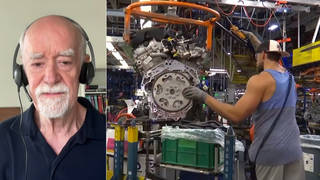
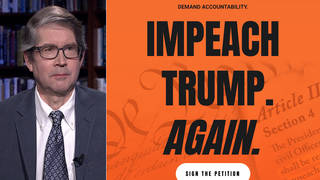
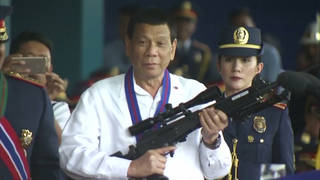
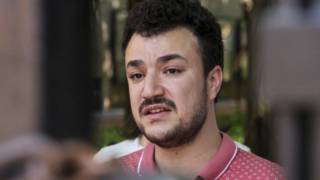





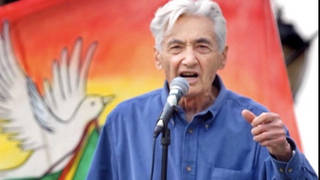

Media Options